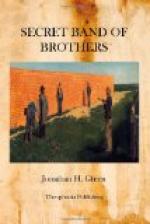“I have it!” exclaimed she. “He has got them.” I need not tell the reader I felt greatly relieved, that there was at least the shadow of evidence, which would serve to clear me and implicate Cunningham. The lady appeared to be intensely excited. I was in doubt what course it would be prudent for me to pursue. Finally, I went to the house of Watkins, and told him that the package I had given him was of no value to any person but myself; that it was made up of various articles of writing, containing hundreds of names, many of which were familiar to me. He looked them over in a cursory manner, and remarked,
“I think there must be witchcraft in these. The letters, though very simple, bear upon their face a suspicious appearance.” He, however, agreed to preserve them with care.
CHAPTER V.
After my interview with Watkins, I felt greatly relieved. I hastened to the hospital to see the colonel, as was my custom, often several times a day. I found him surrounded with visitors, all of whom appeared to be affected while in his presence. He needed sympathy. His mind was tortured. His whole life seemed made up of successive throes of excitement and desperation. His heart was torn by conflicting passions. His confidence and affection for former friends were evidently waning. If any remained, it hung like the tremulous tones of music uncertain and discordant upon its shivered strings. After the principal visitors had retired, the following individuals, three from Lawrenceburgh, two from Cincinnati, one from Madison, and one from Frankfort, made their appearance, accompanied by one of the colonel’s legal advisers. They counseled with him for some time. The legal gentleman remarked, at the close of the mutual conversation:
“It will do. I have conversed with your friends,” calling his two principal attorneys by name. “They say something of that kind must be done. It will have a powerful effect. T. cannot ward off such licks as we will give him.”
The meaning of this fellow was, that bribery could be effectually used. This man, who thus offered to subvert, by the basest of means, the claims of public and private justice, was so lost to shame and self-respect, that he verily thought it an honourable and creditable act, if he could render himself notorious for clearing the most abandoned scoundrels. It argued the most deep-seated depravity, to commit unblushing crime and then glory in his infamy. He heeded not the means, so he accomplished his end. He would not hesitate to implicate himself, for it was but a few days after this, when he offered me a bribe, as before stated, and likewise the counterfeit money. (I here have reference to the five hundred dollars, to which I referred in my work called “Gambling Unmasked.”)
After the party had retired, the colonel said in a few days he would be able to secure bail—that they were waiting for an intimate friend,—a wholesale merchant from Philadelphia. He then conversed with me more freely, and told me much about his enemies in Dearborn Co., Ind., and also his intimate friends. Said he:




